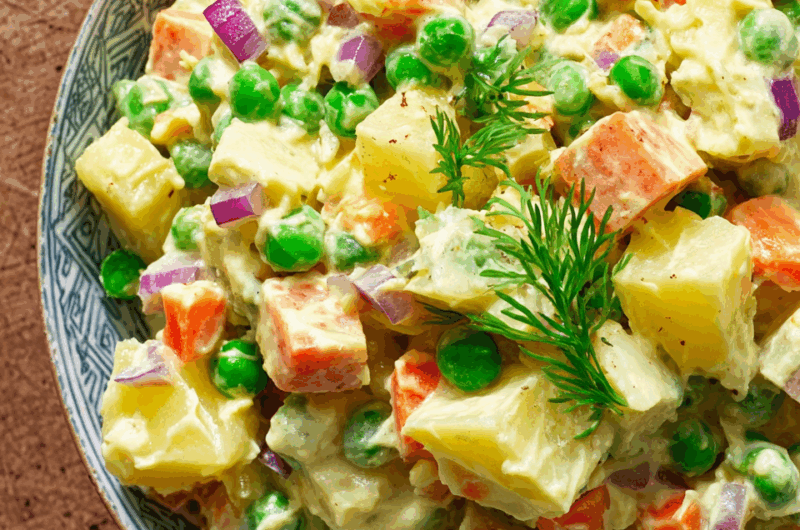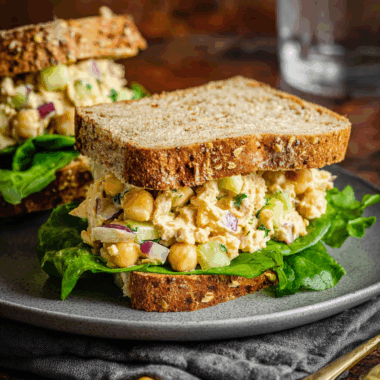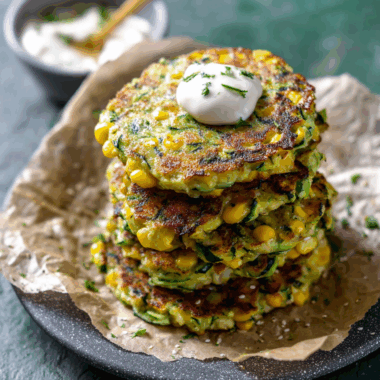The Vegan Olivier Salad is a comforting and creamy adaptation of a beloved Russian classic. Packed with hearty potatoes, sweet carrots, peas, and the zesty bite of pickles, it delivers bold flavor with a nostalgic twist. The vegan mayo adds richness without any animal products, and vegan sausage fills in for the traditional meat—making this salad satisfying, wholesome, and cruelty-free.
Whether you’re celebrating a holiday or just looking for a light, make-ahead lunch, this salad fits the bill. Originally a festive dish in Russian and Eastern European households, it now takes center stage on vegan tables around the world. Make it for your next family gathering, picnic, or potluck and watch it disappear!
Full Recipe:
-
2 medium potatoes, diced
-
1/3 cup green peas
-
1 small carrot, diced
-
1/4 onion, finely chopped
-
1 tsp mustard
-
2 tbsp relish or finely diced pickles
-
3 tbsp vegan mayonnaise
-
1/3 cup veggie soy roll or vegan sausage, diced
-
1/4 tsp fine salt (or 1/2 tsp kosher salt)
-
1/2 tsp ground black pepper
Directions:
-
Boil the diced potatoes, peas, and carrots until just tender—around 5 minutes. Alternatively, steam in an Instant Pot using the Steam setting for 1 minute with quick release.
-
Drain the vegetables and let them cool to room temperature.
-
In a large bowl, combine the cooled vegetables with diced onion, mustard, relish or pickles, vegan sausage, vegan mayonnaise, salt, and black pepper.
-
Mix well to combine. Chill in the fridge for at least 30 minutes before serving for best flavor.
Prep Time: 5 minutes | Cooking Time: 10 minutes | Total Time: 15 minutes
Kcal: 330 kcal | Servings: 2 servings
A Classic Dish with a Vegan Twist: The Story of Olivier Salad
Olivier Salad—also commonly known as Russian Salad or Salat Olivye—is a staple in many households during the holiday season. Originally a luxurious 19th-century French-Russian fusion dish, it has since evolved into a comfort food found on festive tables from Russia to Latin America. The vegan adaptation, now growing in popularity, retains all the richness and satisfaction of the traditional version while aligning with modern dietary choices and ethical eating habits.
The transformation of this iconic salad into a vegan version is not just about substituting ingredients—it’s about celebrating tradition in a way that’s more inclusive and sustainable. Whether you’re new to plant-based cooking or a seasoned vegan, Vegan Olivier Salad offers a unique and flavorful way to enjoy a global classic.
The Origins of Olivier Salad
Olivier Salad was first created in the 1860s by Belgian chef Lucien Olivier, who served it at the Hermitage, a high-end restaurant in Moscow. The original version was far from the humble potato salad we know today. It featured gourmet ingredients such as grouse, crayfish tails, capers, and a secret Provençal sauce that closely resembled mayonnaise.
As the recipe was adapted over time—particularly during the Soviet era when such luxury ingredients became inaccessible—it took on a simpler form. Potatoes, pickles, peas, and processed meats like bologna became standard components, bound together by mayonnaise. This version became emblematic of Soviet-era celebrations and lives on today as the most recognized form of Olivier Salad.
A Global Evolution
Olivier Salad may have Russian roots, but its global journey is just as compelling. In Spain, it is known as Ensaladilla Rusa, often incorporating tuna. In Iran, Salad Olivieh typically contains chicken and is wrapped into sandwiches. Poles have their own version, Sałatka Jarzynowa, which includes beets and sometimes apples.
The global migration of Olivier Salad reflects both cultural adaptation and culinary creativity. Despite these regional differences, the essence of the dish—a creamy, satisfying cold salad made from boiled vegetables and a tangy dressing—remains remarkably consistent. Each culture adds its own flair while preserving the comfort-food quality that defines this salad.
Why Veganize Olivier Salad?
Traditional Olivier Salad includes meat (often bologna or ham), eggs, and mayonnaise—three ingredients that are not suitable for those following a vegan lifestyle. Veganizing the dish makes it accessible to more people, including those who are lactose-intolerant, allergic to eggs, or simply trying to eat more sustainably.
More than just a substitution, veganizing Olivier Salad can actually elevate the dish. With innovations in plant-based sausages and egg-free mayo, many versions taste just as good—if not better—than their animal-based counterparts. Vegan sausage options now include seitan, tofu, and soy-based products that mimic the texture and savory flavor of traditional meats, while vegan mayonnaise adds creaminess without cholesterol.
Key Components that Make It Shine
While we won’t dive into the ingredient list, it’s worth discussing what makes this dish unique from a flavor and texture standpoint. The creamy element is crucial—it binds all the components together and enhances the flavor of the vegetables. Pickles or relish add a necessary acidity and brightness that balance the richness. The peas and carrots bring sweetness and color, while potatoes provide a hearty base that gives the dish its substantial character.
Vegan Olivier Salad also benefits from textural contrast. When diced finely, each bite offers a blend of softness from the potatoes, slight crunch from carrots and onions, and a chewy bite from the vegan sausage. This complexity keeps the salad interesting and makes it much more than just another side dish.
A Seasonal Staple Turned Year-Round Favorite
In many countries, Olivier Salad is synonymous with holiday meals, particularly Christmas and New Year’s Eve. In Russia and Ukraine, for example, no holiday table is complete without a large bowl of this salad. However, the vegan version opens the door to enjoying this dish beyond the cold months.
Because it’s served cold, Vegan Olivier Salad also works beautifully as a summer picnic food, potluck addition, or even a light lunch. It travels well, keeps in the fridge for several days, and can be prepped in advance—making it a practical, not just delicious, meal option.
Health and Nutritional Benefits
While traditional Olivier Salad can be high in saturated fats and sodium, the vegan version is often lighter and more nutritious. Vegan mayonnaise can be made with ingredients like aquafaba, mustard, olive oil, and vinegar, significantly reducing cholesterol and fat content.
Moreover, the vegetables in the dish contribute fiber, vitamins, and minerals. Potatoes are rich in potassium, carrots offer beta-carotene, and peas bring in plant-based protein. When combined with vegan protein sources like seitan or tofu sausage, the salad becomes a nutritionally balanced dish that satisfies without the post-meal sluggishness.
Vegan Mayonnaise: A Silent Hero
The type of vegan mayonnaise you use can significantly influence the final flavor of your salad. Store-bought options are convenient and consistent, but homemade vegan mayo can be customized to your preferred tanginess, salt level, and texture.
Popular DIY versions use aquafaba (chickpea water), mustard, vinegar, and neutral oils to create a creamy, emulsified dressing that’s both light and flavorful. Adding black salt (kala namak) provides an eggy aroma that can make the salad taste surprisingly close to the original.
Customizable and Crowd-Pleasing
Another advantage of Vegan Olivier Salad is its versatility. You can omit the vegan sausage for a lighter dish or swap it with roasted chickpeas or marinated tofu. Want to jazz it up? Add fresh herbs like dill or parsley for a fragrant touch. Prefer a punchier flavor? A dash of horseradish or Dijon mustard can elevate the profile instantly.
Its flexibility makes it ideal for families, gatherings, or meal preppers. You can scale the recipe up or down, make it ahead of time, and even use leftovers creatively—think sandwich fillings, wraps, or stuffed avocado boats.
Cultural Resonance in a Modern Kitchen
Food is one of the most powerful ways we connect with culture, heritage, and community. For those who grew up eating Olivier Salad during family holidays, the vegan version can rekindle fond memories without compromising values or dietary restrictions. It’s a beautiful way to pass down tradition while aligning it with current lifestyles.
This recipe also acts as a gateway to exploring other veganized international dishes. From vegan borscht to plant-based pelmeni, there’s a whole world of Eastern European cuisine waiting to be rediscovered and reimagined for the modern table.
Conclusion: Comfort Food, Redefined
Vegan Olivier Salad is more than just a veganized potato salad—it’s a celebration of history, a testament to culinary adaptability, and a dish that unites diverse palates across generations and cultures. Whether you’re serving it as a festive centerpiece or a casual weekday lunch, this dish delivers on flavor, texture, and nostalgia.
With its creamy dressing, vibrant vegetables, and hearty components, Vegan Olivier Salad earns its place as a comfort food classic. And best of all, it proves that tradition can evolve—tastes can change, recipes can be reimagined, and everyone can still have a seat at the table.








